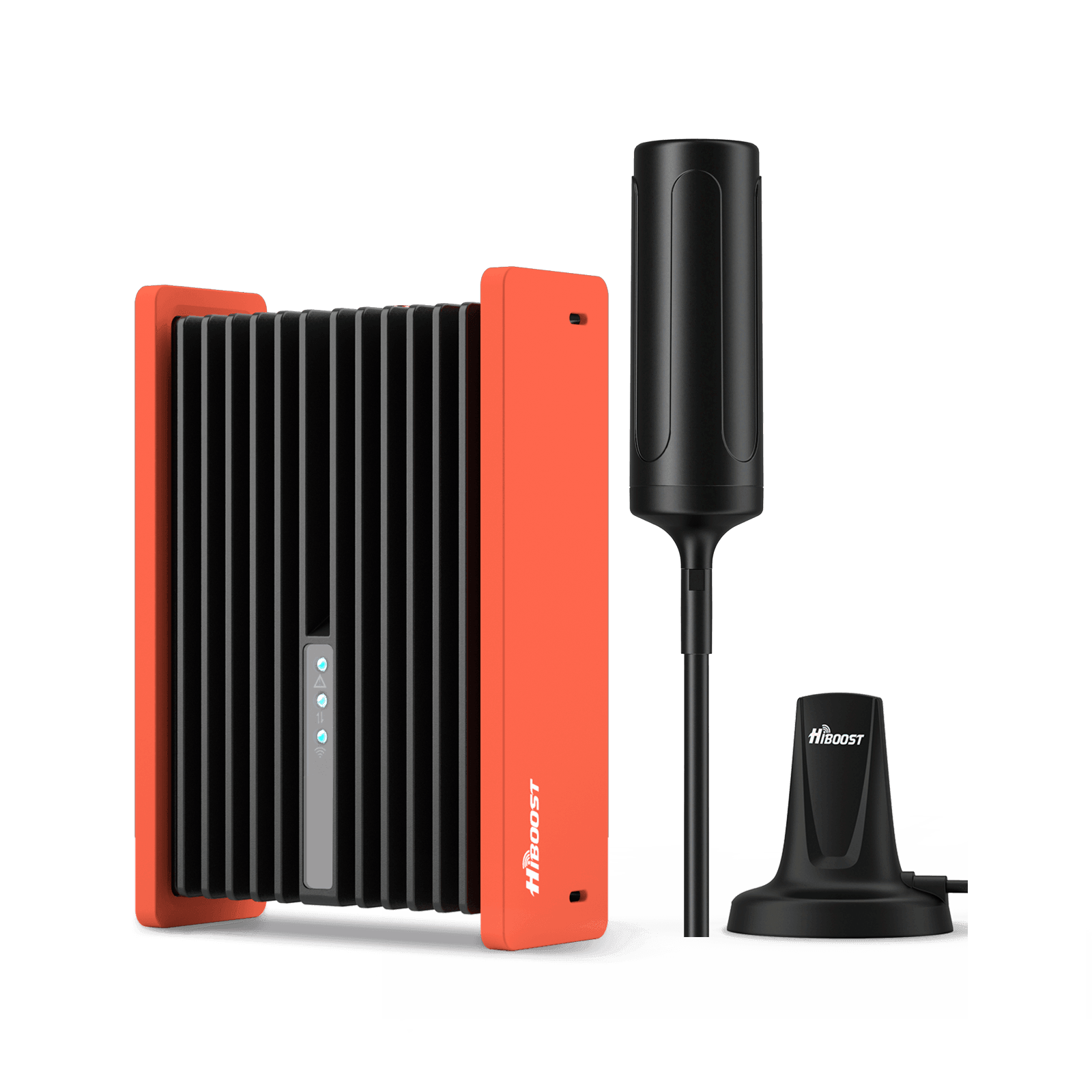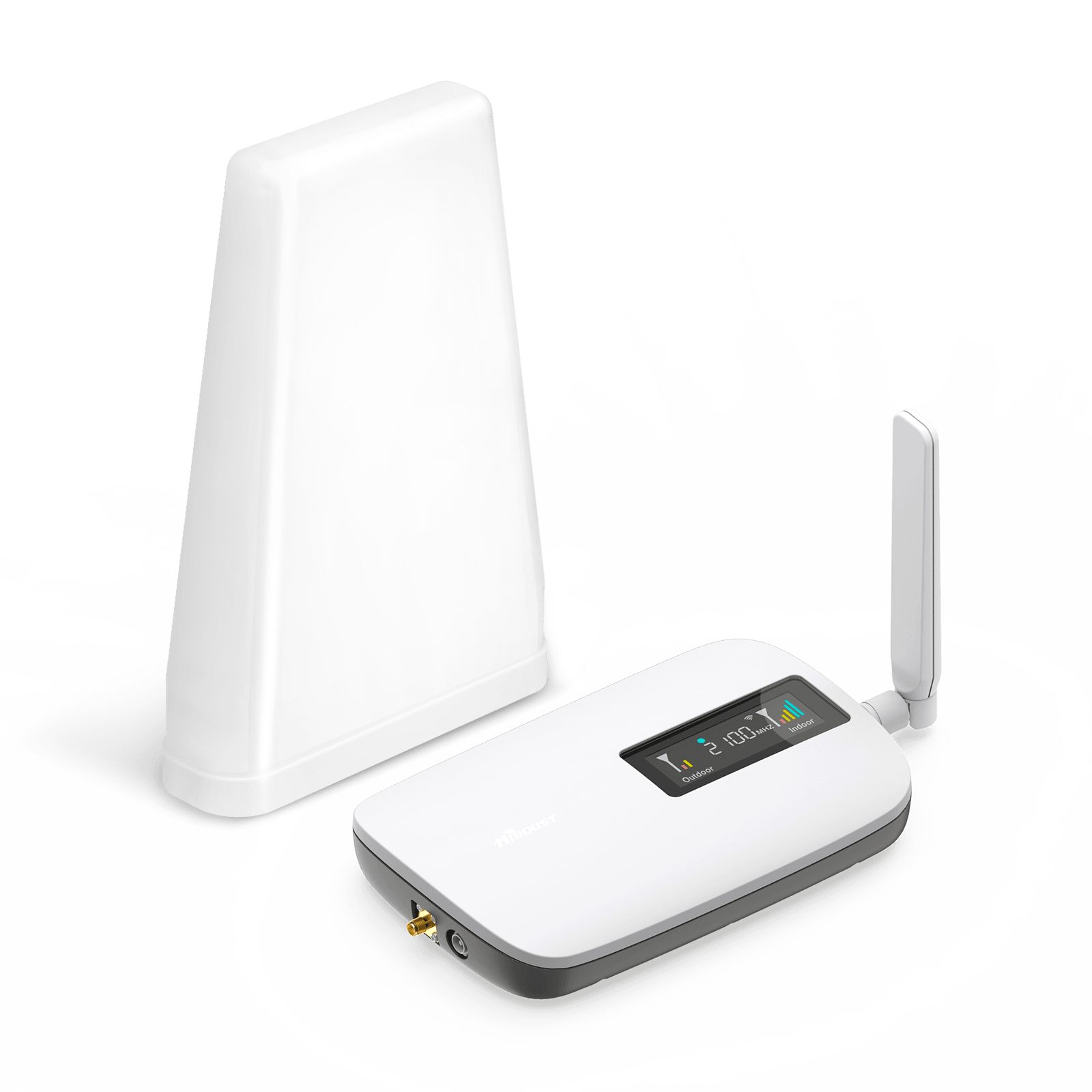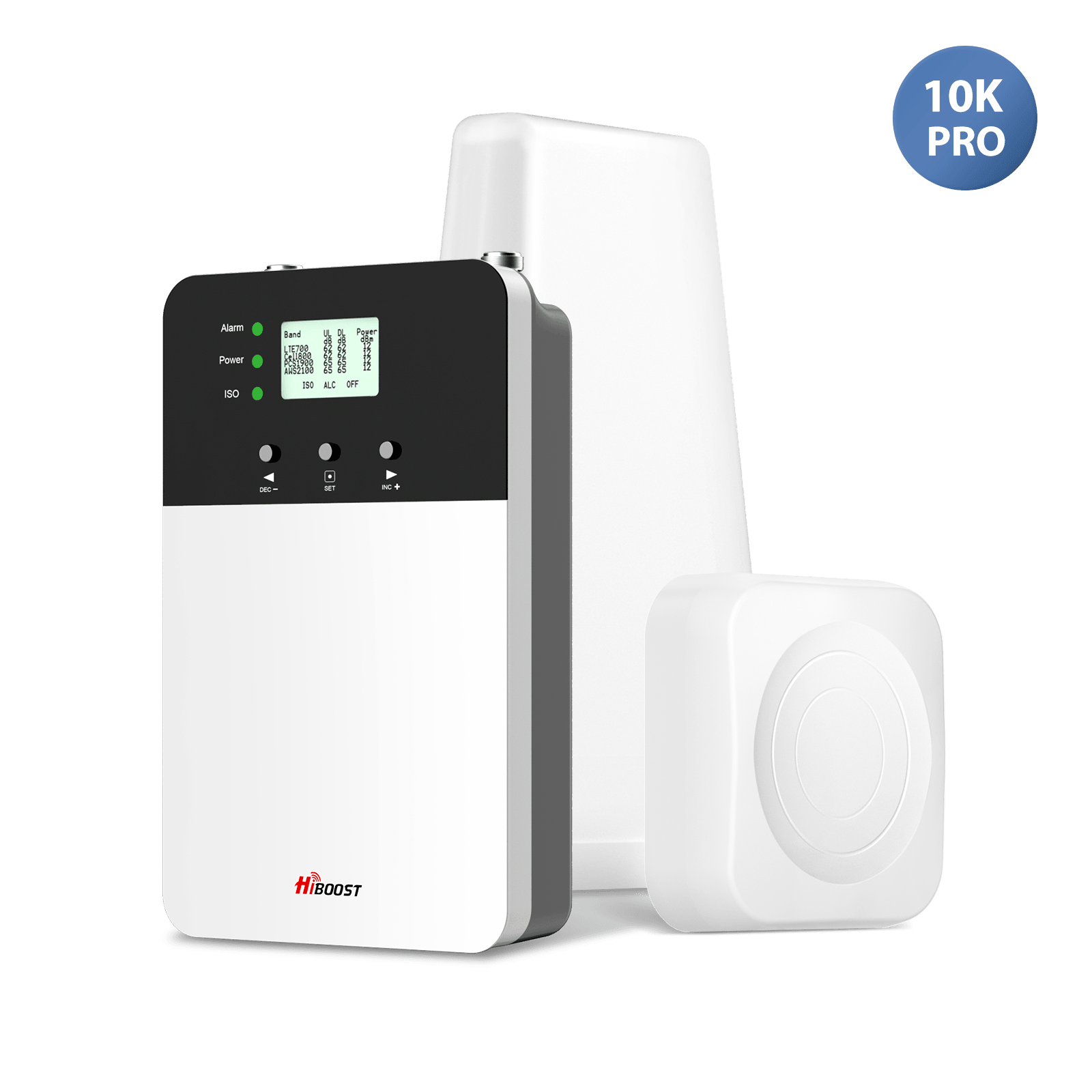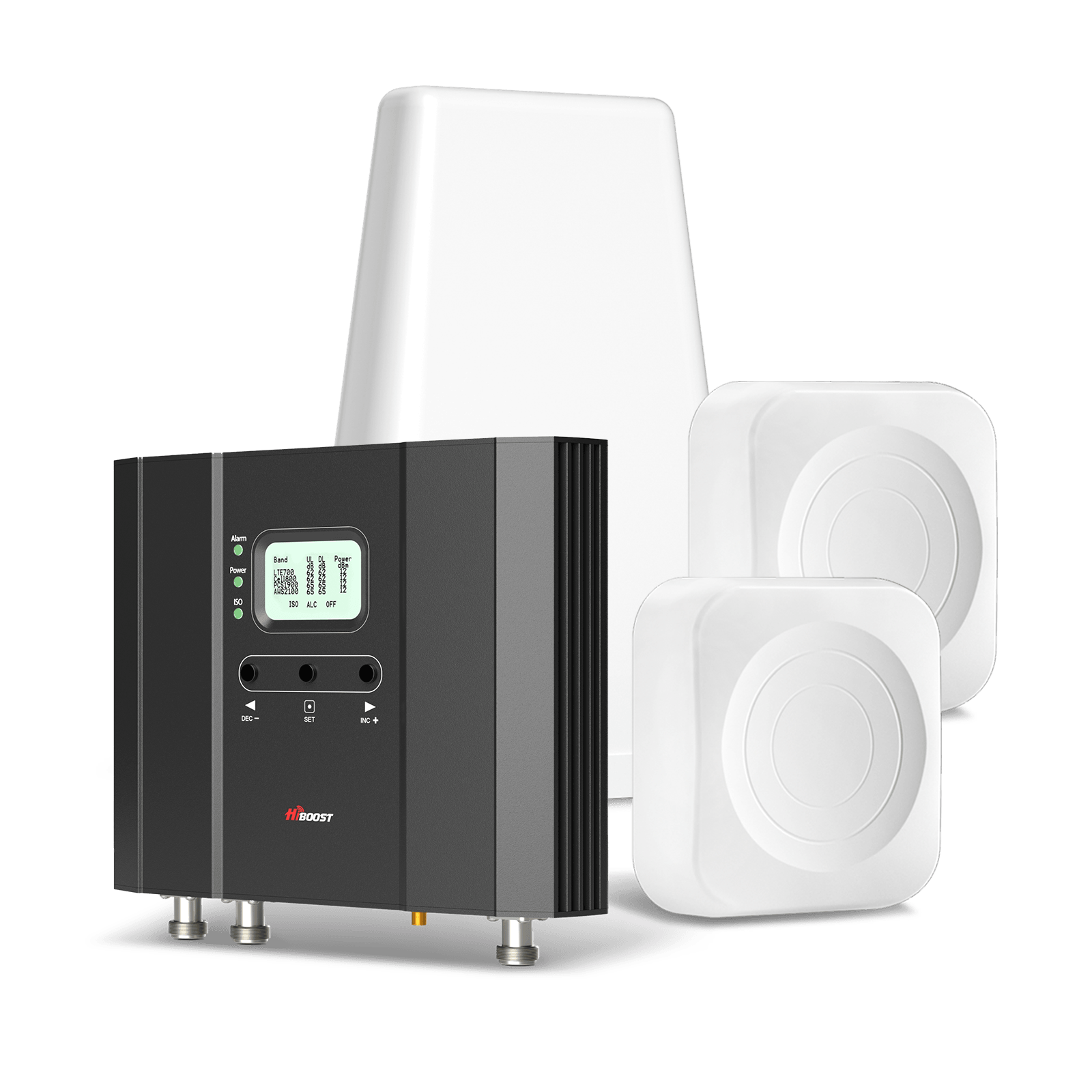Table of Contents
FunctionDropped calls, slow data speeds, and dead zones—few things are more frustrating than unreliable cell service. Whether at home, in the office, or on the road, poor connectivity disrupts work, entertainment, and even emergency communication.

Imagine trying to join an important Zoom meeting, but your voice keeps cutting out. Or attempting to send a text, only to see "Message Failed" pop up again and again.
Many homeowners and businesses struggle with weak cell signals, causing delays, miscommunication, and lost opportunities. But before you invest in a solution, it’s essential to understand the difference between cell phone extenders and network extenders.
Both improve signal strength, but they work in different ways and serve distinct needs.
A cell phone extender, also known as a signal booster, amplifies existing cell signals to improve coverage in weak areas. A network extender, or femtocell, creates a mini cell tower in your home or office using an internet connection.
Choosing the right solution depends on your environment, carrier restrictions, and the specific connectivity issues you face. For rural homes, a cell phone extender can help pull in signals from distant towers.
For urban apartments with thick walls, a network extender might be the better option. Businesses with multiple floors often benefit from a combination of both technologies for optimal coverage.
If you travel frequently in an RV or vehicle, a mobile cell phone extender ensures connectivity on the go. Understanding the key differences, advantages, and limitations of each option is crucial to making the right investment.
In this guide, we’ll break down how each solution works, their pros and cons, and how to determine which one best suits your needs.
Cell Phone Extenders & Range Extenders: Solving Poor Connectivity Issues
The Struggle with Weak Signals
Few things are more frustrating than weak cell signals, dropped calls, or sluggish internet speeds that disrupt daily life. Whether you're working from home, streaming a video, or making an important call, poor connectivity can be infuriating.
Thick walls, long distances from cell towers, and interference from electronic devices weaken signals, causing unreliable performance.
In rural areas, sparse tower coverage leads to dead zones where calls drop or fail to connect entirely.
In urban environments, concrete buildings, underground spaces, and crowded networks reduce signal strength and speed. Businesses lose customers and revenue due to missed calls, lagging response times, and unreliable service.
For those on the road, traveling through remote highways or mountainous regions often means no service at all.
Cell phone extenders and range extenders offer solutions, but choosing the right one depends on your unique connectivity challenges.
What is a Cell Phone Extender?
A cell phone extender, also known as a signal booster, enhances existing signals from nearby towers. It consists of an outdoor antenna, an amplifier, and an indoor antenna to distribute the boosted signal. Ideal for homes, offices, and vehicles, it strengthens weak signals and expands coverage within the area.
Cell phone extenders work for multiple carriers, making them a versatile solution for households with different service providers. These devices do not rely on Wi-Fi or broadband, making them suitable for rural locations with limited internet access. However, they require at least some existing signal to amplify—if there’s no signal at all, they won’t work.

What is a Range Extender?
A range extender, often called a Wi-Fi extender, expands the reach of your wireless internet network. It captures the existing Wi-Fi signal and rebroadcasts it to areas with weak or no coverage. Perfect for large homes, offices, or buildings with multiple floors, it helps eliminate dead zones in Wi-Fi coverage.
Unlike cell phone extenders, range extenders rely on an active internet connection to function. They enhance browsing speeds, streaming quality, and connectivity for smart home devices within their extended range. However, range extenders do not improve cellular signal strength or reception for phone calls and mobile data.
Which One Do You Need?
If you struggle with weak cell service and dropped calls, a cell phone extender is the right choice. If your primary issue is slow or spotty Wi-Fi coverage, a range extender will enhance your internet experience. For businesses, investing in both solutions ensures seamless communication and connectivity across all devices.
Rural residents benefit most from cell phone extenders, while urban users often need Wi-Fi range extenders. Understanding your specific needs will help you invest in the right technology for a frustration-free connection.

What Are Cell Phone Repeaters?
Dropped calls, slow data, and frustrating dead zones—weak cell signals create daily headaches for homeowners, businesses, and travelers. Imagine missing an important call because your phone keeps losing service. Or struggling to load a simple webpage due to poor reception.
Weak signals are caused by distance from cell towers, building materials, and interference from obstacles like hills and trees. Fortunately, a cell phone repeater—also known as a signal booster—can amplify weak signals and improve connectivity.
If you live in a rural area, work in a basement office, or drive through dead zones, a repeater could be the solution you need.
How Do Cell Phone Repeaters Work?
A repeater captures, amplifies, and rebroadcasts existing cell signals to improve coverage. It consists of three main components: an outside antenna, an amplifier, and an inside antenna.
- Outside Antenna: Installed on a roof or vehicle, it pulls in the nearest cell tower signal.
- Amplifier: Boosts the weak signal to a usable strength.
- Inside Antenna: Rebroadcasts the improved signal inside your home, office, or vehicle.
This process allows your phone to receive a stronger and more stable connection, reducing dropped calls and increasing data speeds.
Who Needs a Cell Phone Repeater?
Rural Homeowners: Living far from cell towers can result in weak or non-existent signals. A repeater pulls in signals from distant towers.
City Residents: Thick walls and building materials can block signals in apartments and offices. A repeater helps bypass these obstacles.
Businesses: Offices with dead zones experience poor call quality and unreliable connections. Boosting the signal improves productivity.
Truckers & RV Travelers: Long-distance drivers often travel through low-signal areas. A repeater ensures consistent connectivity on the road.
Basements & Large Buildings: Below-ground offices or big structures often suffer from weak reception. A repeater enhances coverage.
Benefits of Using a Cell Phone Repeater
- Fewer Dropped Calls: Stronger signals mean more reliable connections and better call quality.
- Faster Data Speeds: Improved signal strength results in quicker downloads, smoother streaming, and better browsing.
- Better Indoor Coverage: No more running to windows or stepping outside to make a call.
- Extended Battery Life: Phones use less power searching for a signal, improving battery performance.
- Works with All Carriers: Most repeaters support multiple networks, making them a versatile solution.
Things to Consider Before Buying a Repeater
- Existing Signal Strength: A repeater amplifies signals—it won’t work if there’s no signal to boost.
- Coverage Area: Choose a model based on the square footage you need to cover.
- Frequency Compatibility: Ensure the repeater supports your carrier’s frequency bands.
- Installation Requirements: Some systems require professional installation, while others are plug-and-play.
Cell phone repeaters are a game-changer for anyone struggling with poor connectivity. Whether you're at home, in the office, or on the road, a signal booster can enhance your experience and keep you connected.
If weak signals disrupt your daily life, investing in a repeater could be the perfect solution.

What Are Cell Phone Network Extenders?
Dropped calls, slow data speeds, and frustrating dead zones—these are common struggles in homes, offices, and remote locations. Whether you live in a rural area or work in a building with thick walls, poor reception can disrupt communication, affect productivity, and limit access to essential online services.
A weak signal can be caused by:
- Distance from the nearest cell tower
- Interference from buildings, trees, or terrain
- Congestion on the network
- Energy-efficient windows blocking signals
Thankfully, cell phone network extenders, also known as cell signal boosters, provide an effective solution.
What Are Cell Phone Network Extenders?
Cell phone network extenders amplify weak signals to ensure clear calls, faster data speeds, and consistent connectivity. They work by capturing existing signals, enhancing them, and rebroadcasting the improved signal inside your home, office, or vehicle.
Benefits of Using a Cell Phone Network Extender
- Eliminates dropped calls – Say goodbye to frustrating call interruptions.
- Boosts data speeds – Enjoy faster browsing, streaming, and downloads.
- Enhances voice quality – Clearer conversations without static or lag.
- Supports multiple devices – Ideal for families, businesses, and shared spaces.
- Works with all carriers – No need to switch providers; compatible with major networks.
- Easy to install – No technical expertise required; plug and play solutions available.
Top HiBoost Cell Signal Boosters
At HiBoost, we offer cutting-edge solutions designed for homes, offices, and vehicles. Here’s how our top models can help:
HiBoost 10K Smart Link Cellular Booster
- Covers up to 10,000 sq. ft., ideal for large homes and offices.
- Boosts signals for all major carriers, ensuring universal compatibility.
- Smart Link technology allows remote monitoring via a mobile app.
- Advanced LCD display for real-time diagnostics.
HiBoost Hero Cell Phone Signal Booster
- Perfect for medium to large homes, with up to 6,500 sq. ft. coverage.
- Strong amplification for voice and data, ensuring fewer dropped calls.
- Works seamlessly with all U.S. and Canadian carriers.
- DIY-friendly installation with a step-by-step guide.
HiBoost 4K Mate Pro Cell Signal Amplifier
- Covers up to 4,000 sq. ft., ideal for apartments and small offices.
- Boosts 4G LTE and 5G signals for improved voice and data.
- Smart functionality with app-based signal strength monitoring.
- Compact design for easy installation and discreet placement.
HiBoost 4K Mate Plus Cell Phone Amplifier
- Extends coverage up to 4,000 sq. ft. for improved reception.
- Reduces dropped calls and improves data speeds for streaming and gaming.
- Works with all major carriers, ensuring a stable connection.
- Simple, plug-and-play setup with an intuitive interface.
HiBoost Sidekick Cell Signal Booster for Home
- Designed for small spaces, covering up to 2,000 sq. ft.
- Eliminates dead zones in apartments and home offices.
- User-friendly setup with automatic gain control.
- Affordable solution for individuals needing reliable connectivity.
HiBoost 10K Plus Pro Phone Signal Booster
- Premium performance for homes and businesses up to 10,000 sq. ft.
- Maximizes signal strength for multiple users simultaneously.
- App-controlled monitoring for real-time signal adjustments.
- High-gain outdoor antenna for improved reception even in remote areas.
How to Choose the Right Cell Phone Network Extender
When selecting a signal booster, consider:
- Coverage Area – Match the booster to the size of your home or office.
- Carrier Compatibility – Ensure the booster supports your network.
- Installation Ease – Opt for a model with a straightforward setup.
- Signal Strength Needs – Choose based on the severity of signal issues.
A cell phone network extender is a game-changer for anyone facing weak signal issues. HiBoost offers a range of powerful, easy-to-install solutions to keep you connected at all times. Whether you need coverage for a small apartment or a large commercial space, we have the perfect solution for you.
Upgrade your connectivity today with HiBoost and experience uninterrupted calls and high-speed data like never before!
Comparison Between Cell Phone Extenders and Network Extenders
Experiencing dropped calls, slow internet, and poor reception? You’re not alone. Many homes and businesses face connectivity issues due to weak signals, but finding the right solution can be confusing.
Should you choose a cell phone signal extender or a network extender? Understanding their differences can help you make the right choice.

What Are Cell Phone Signal Extenders?
Cell phone signal extenders, also known as signal boosters, amplify existing weak signals to improve call quality and data speeds. They work by capturing outside signals, boosting them, and rebroadcasting them indoors.
Key Benefits of Cell Phone Signal Extenders
- Improves Signal Strength – Enhances coverage even in remote areas or basements.
- Works with All Carriers – No need to change service providers.
- Boosts Voice & Data Signals – Supports calls, texting, and mobile internet.
- Supports Multiple Devices – Great for families and businesses.
No Internet Dependency – Works with available network signals.

What Are Network Extenders?
Network extenders, also called femtocells, create a localized mini cell tower using your home internet connection. They generate a cellular signal indoors by routing calls and data through broadband.
Key Benefits of Network Extenders
- Creates a Reliable Indoor Network – Useful for homes with no signal.
- Carrier-Specific – Works only with a single provider.
- Requires Internet Access – Uses broadband to relay phone calls and data.
- Limited Coverage Area – Usually covers a single home or office.
Enhances Call Quality – Reduces dropped calls in weak signal areas.

Comparing Cell Phone Signal Extenders vs. Network Extenders
| Feature | Cell Phone Signal Extenders | Network Extenders |
| Signal Source | Amplifies existing outdoor signal | Uses broadband connection |
| Carrier Compatibility | Works with all networks | Carrier-specific |
| Internet Requirement | No internet needed | Requires broadband |
| Coverage Area | Large coverage, up to 10,000 sq. ft. | Small indoor area |
| Device Support | Supports multiple carriers and devices | Works with one carrier only |
Which One Should You Choose?
- Choose a Cell Phone Extender If: You need better signal coverage without relying on the internet.
- Choose a Network Extender If: You have a stable broadband connection but no cell reception.
Both solutions improve connectivity, but a cell phone signal extender is often the better choice for flexibility, broader coverage, and carrier compatibility. Understanding your needs will help you pick the right solution to stay connected without interruptions.

The Difference Between Boosters, Repeaters, and Extenders
Dropped calls, slow internet, and dead zones are common issues that affect both homes and businesses. Understanding the differences between boosters, repeaters, and extenders can help you choose the right solution for a stronger and more reliable signal.

What Are Signal Boosters?
Signal boosters amplify weak signals from nearby cell towers and rebroadcast them inside your home or office. They improve call quality, increase data speeds, and enhance overall connectivity.
Key Benefits of Signal Boosters
- Amplifies Weak Signals – Enhances reception in areas with poor coverage.
- Supports Multiple Devices – Works for phones, tablets, and laptops.
- Compatible with All Carriers – Works across different networks without restrictions.
- Doesn’t Require Internet – Uses available cell signals without broadband dependency.
Covers Large Areas – Provides signal boost for homes, offices, and vehicles.
What Are Signal Repeaters?
Signal repeaters receive and rebroadcast an existing signal, improving coverage in a specific area. Unlike boosters, they do not amplify the signal but rather extend its range.
Key Benefits of Signal Repeaters
- Extends Existing Signal – Ideal for areas with some reception but weak coverage.
- Works Well in Open Areas – Commonly used in outdoor settings.
- Lower Cost Solution – More affordable than signal boosters.
- Simple Installation – Requires minimal setup and maintenance.
- No Need for Internet – Operates solely on available network signals.
What Are Signal Extenders?
Signal extenders, also known as network extenders or femtocells, create a personal mini cell tower in your home or office. They connect to your broadband and provide a new cellular signal indoors.
Key Benefits of Signal Extenders
- Creates a Reliable Indoor Network – Perfect for homes with no signal.
- Requires Internet Connection – Uses broadband to generate a strong signal.
- Carrier-Specific – Works only with a designated service provider.
- Enhances Call Quality – Reduces dropped calls and improves voice clarity.
- Limited Coverage Area – Best for single-room or small home use.
Comparing Boosters, Repeaters, and Extenders
| Feature | Signal Boosters | Signal epeaters | Signal Extenders |
| Function | Amplifies weak signals | Rebroadcasts existing signals | Creates a new signal |
| Internet Dependency | No | No | Yes |
| Coverage Area | Large | Medium | Small |
| Carrier Compatibility | Works with all carriers | Works with all carriers | Carrier-specific |
| Best For | Homes, offices, vehicles | Open areas, warehouses | Homes with no reception |
Which One Is Right for You?
- Choose a Signal Booster If: You need to strengthen weak signals and improve coverage across multiple rooms.
- Choose a Signal Repeater If: You have some reception but need better coverage in a specific area.
- Choose a Signal Extender If: You have no signal but have reliable broadband access.
Boosters, repeaters, and extenders each serve different purposes in enhancing connectivity. Understanding their functions will help you make the right choice to ensure uninterrupted communication in your home, office, or outdoor space.
Struggling with Weak Signals? Find the Right Solution
Dropped calls, slow internet speeds, and frustrating dead zones can disrupt daily life and business operations. Whether you need better cell reception or stronger Wi-Fi, understanding the purpose of a booster, repeater, or extender is crucial.
What Is the Purpose of a Signal Booster?
A signal booster enhances weak cell signals by amplifying them and rebroadcasting them indoors. It ensures better call quality, improved data speeds, and fewer connectivity issues.
Key Benefits of a Signal Booster
- Amplifies Weak Signals – Ideal for rural homes, offices, and vehicles.
- Supports Multiple Devices – Works across different networks and carriers.
- No Internet Required – Uses available cellular signals without broadband dependency.
- Covers Large Areas – Provides signal improvement for entire buildings.
- Reduces Dropped Calls – Ensures stable and clear voice communication.
What Is the Purpose of a Signal Repeater?
A signal repeater receives an existing signal and retransmits it to extend its range, making it useful for improving coverage in specific areas without amplification.
Key Benefits of a Signal Repeater
- Extends Existing Signal – Ideal for filling coverage gaps in large spaces.
- Cost-Effective Solution – More affordable than boosters for basic needs.
- Simple Setup – Easy installation with minimal maintenance.
- Works Well in Open Spaces – Ideal for warehouses, farms, and outdoor areas.
- No Internet Dependency – Operates solely on available signals.
What Is the Purpose of a Signal Extender?
A signal extender, also known as a network extender or femtocell, creates a personal mini cell tower using an internet connection, making it perfect for areas with no reception.
Key Benefits of a Signal Extender
- Creates a Reliable Indoor Network – Ensures a stable signal in areas with no coverage.
- Requires Internet Connection – Uses broadband to generate a strong cell signal.
- Carrier-Specific – Works only with a designated service provider.
- Improves Call Quality – Reduces dropped calls and enhances voice clarity.
- Best for Homes and Small Offices – Ideal for areas with poor cellular coverage.
Choosing the Right Solution for Your Needs
| Feature | Signal Booster | Signal Repeater | Signal Extender |
| Function | Amplifies weak signals | Rebroadcasts existing signals | Creates a new signal |
| Internet Requirement | No |
No |
Yes |
| Coverage Area | Large | Medium | Small |
| Carrier | Works with all | Works with all | Carrier-specific |
| Compatibility | carriers | carriers | |
| Best Use Case | Homes, offices, vehicles | Warehouses, open areas |
Homes with no reception |
Understanding the purpose of a booster, repeater, or extender can help you make an informed decision. Choose the right device to eliminate weak signals, enhance connectivity, and ensure uninterrupted communication in your home, office, or outdoor space.

What Cell Boosting System Works for You?
Dropped calls, slow data speeds, and constant signal interruptions can be frustrating. A reliable cell boosting system can enhance connectivity, but choosing the right one depends on your specific needs and environment.
Choosing the Right Cell Boosting System
- For Homes and Offices: A multi-room booster with powerful amplification ensures seamless coverage in larger spaces.
- For Vehicles: A mobile signal booster improves connectivity while driving in rural or low-signal areas.
- For Remote Locations: A high-gain directional booster is ideal for areas far from cell towers.
- For Small Spaces: A plug-and-play booster works best for apartments or single rooms.
Factors to Consider
- Coverage Area – Choose a system based on the size of your space.
- Carrier Compatibility – Ensure it supports your mobile network.
- Installation Complexity – Pick an easy-to-install model if you're a DIY user.
- Signal Strength Needs – Determine if you need a minor boost or a high-power solution.
Selecting the right cell boosting system ensures uninterrupted calls and fast data speeds. Evaluate your needs and invest in a solution that keeps you connected anytime, anywhere.
Choosing between a cell phone extender and a network extender depends on your specific needs. If you’re struggling with weak outdoor signals that need a boost inside, a cell phone signal booster like those from HiBoost is your best bet.
These devices amplify existing signals, providing reliable coverage across homes, offices, and even vehicles.
On the other hand, if you have no signal at all and rely on an internet connection, a network extender might be the better solution. These devices create a microcell using your broadband internet, ensuring calls and texts can still go through even in dead zones.
Ultimately, the right choice comes down to whether you have an existing signal to amplify or need to create coverage from scratch. By understanding the differences, you can invest in the right solution to keep your calls, texts, and data running smoothly—wherever you need them.












Leave a comment
All comments are moderated before being published.
This site is protected by hCaptcha and the hCaptcha Privacy Policy and Terms of Service apply.